
trainer
Distributed AI Model Training and LLM Fine-Tuning on Kubernetes
Stars: 2025
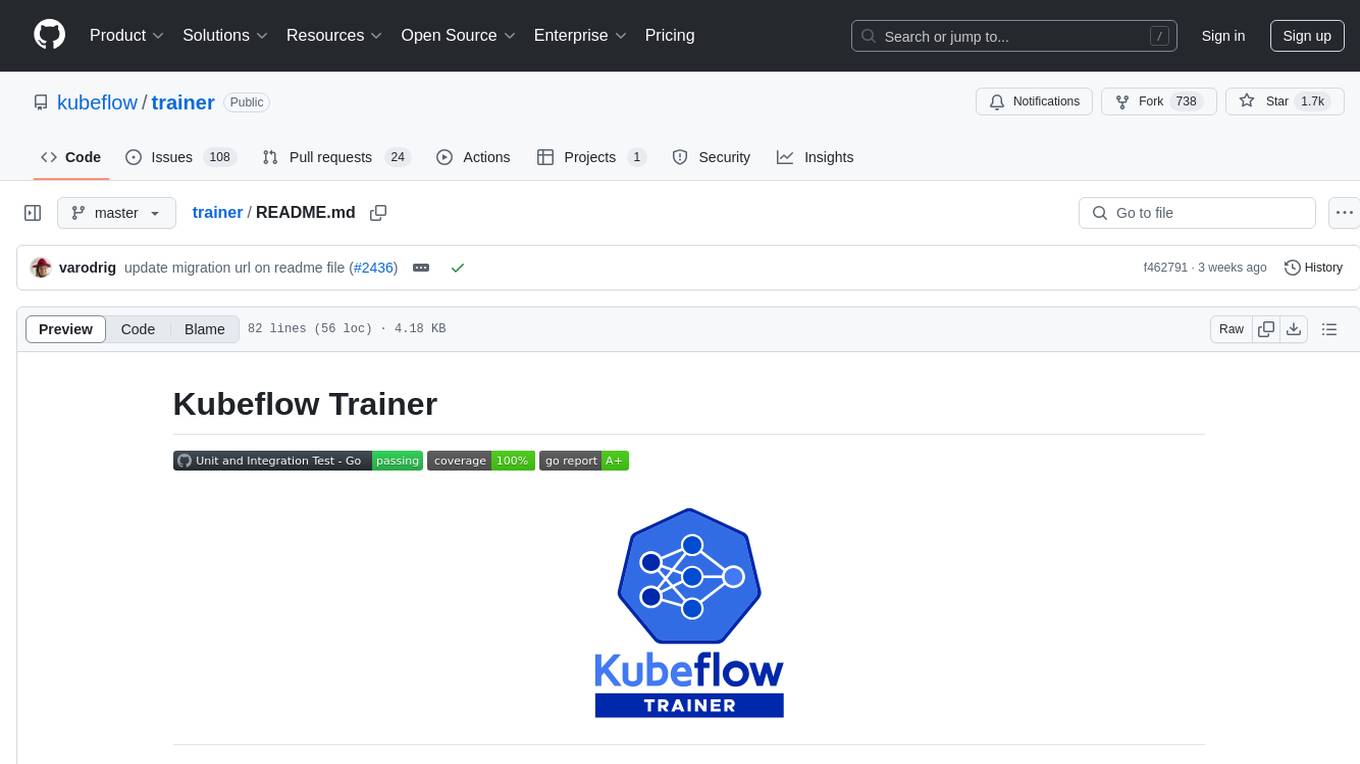
Kubeflow Trainer is a Kubernetes-native project for fine-tuning large language models (LLMs) and enabling scalable, distributed training of machine learning (ML) models across various frameworks. It allows integration with ML libraries like HuggingFace, DeepSpeed, or Megatron-LM to orchestrate ML training on Kubernetes. Develop LLMs effortlessly with the Kubeflow Python SDK and build Kubernetes-native Training Runtimes with Kubernetes Custom Resources APIs.
README:
Latest News 🔥
- [2025/11] Kubeflow Trainer v2.1 is officially released with support of Distributed Data Cache, topology aware scheduling with Kueue and Volcano, and LLM post-training enhancements. Check out the GitHub release notes.
- [2025/09] Kubeflow SDK v0.1 is officially released with support for CustomTrainer, BuiltinTrainer, and local PyTorch execution. Check out the GitHub release notes.
- [2025/07] PyTorch on Kubernetes: Kubeflow Trainer Joins the PyTorch Ecosystem. Find the announcement in the PyTorch blog post.
More
- [2025/07] Kubeflow Trainer v2.0 has been officially released. Check out the blog post announcement and the release notes.
- [2025/04] From High Performance Computing To AI Workloads on Kubernetes: MPI Runtime in Kubeflow TrainJob. See the KubeCon + CloudNativeCon London talk
Kubeflow Trainer is a Kubernetes-native distributed AI platform for scalable large language model (LLM) fine-tuning and training of AI models across a wide range of frameworks, including PyTorch, MLX, HuggingFace, DeepSpeed, JAX, XGBoost, and more.
Kubeflow Trainer brings MPI to Kubernetes, orchestrating multi-node, multi-GPU distributed jobs efficiently across high-performance computing (HPC) clusters. This enables high-throughput communication between processes, making it ideal for large-scale AI training that requires ultra-fast synchronization between GPUs nodes.
Kubeflow Trainer seamlessly integrates with the Cloud Native AI ecosystem, including Kueue for topology-aware scheduling and multi-cluster job dispatching, as well as JobSet and LeaderWorkerSet for AI workload orchestration.
Kubeflow Trainer provides a distributed data cache designed to stream large-scale data with zero-copy transfer directly to GPU nodes. This ensures memory-efficient training jobs while maximizing GPU utilization.
With the Kubeflow Python SDK, AI practitioners can effortlessly develop and fine-tune LLMs while leveraging the Kubeflow Trainer APIs: TrainJob and Runtimes.
Checkout following KubeCon + CloudNativeCon talks for Kubeflow Trainer capabilities:
Additional talks:
- From High Performance Computing To AI Workloads on Kubernetes: MPI Runtime in Kubeflow TrainJob
- Streamline LLM Fine-tuning on Kubernetes With Kubeflow LLM Trainer
Please check the official Kubeflow Trainer documentation to install and get started with Kubeflow Trainer.
The following links provide information on how to get involved in the community:
- Join our
#kubeflow-trainerSlack channel. - Attend the bi-weekly AutoML and Training Working Group community meeting.
- Check out who is using Kubeflow Trainer.
Please refer to the CONTRIBUTING guide.
Please refer to the CHANGELOG.
Kubeflow Trainer project is currently in alpha status, and APIs may change. If you are using Kubeflow Training Operator V1, please refer to this migration document.
Kubeflow Community will maintain the Training Operator V1 source code at
the release-1.9 branch.
You can find the documentation for Kubeflow Training Operator V1 in these guides.
This project was originally started as a distributed training operator for TensorFlow and later we merged efforts from other Kubeflow Training Operators to provide a unified and simplified experience for both users and developers. We are very grateful to all who filed issues or helped resolve them, asked and answered questions, and were part of inspiring discussions. We'd also like to thank everyone who's contributed to and maintained the original operators.
- PyTorch Operator: list of contributors and maintainers.
- MPI Operator: list of contributors and maintainers.
- XGBoost Operator: list of contributors and maintainers.
- Common library: list of contributors and maintainers.
For Tasks:
Click tags to check more tools for each tasksFor Jobs:
Alternative AI tools for trainer
Similar Open Source Tools

trainer
Kubeflow Trainer is a Kubernetes-native project for fine-tuning large language models (LLMs) and enabling scalable, distributed training of machine learning (ML) models across various frameworks. It allows integration with ML libraries like HuggingFace, DeepSpeed, or Megatron-LM to orchestrate ML training on Kubernetes. Develop LLMs effortlessly with the Kubeflow Python SDK and build Kubernetes-native Training Runtimes with Kubernetes Custom Resources APIs.
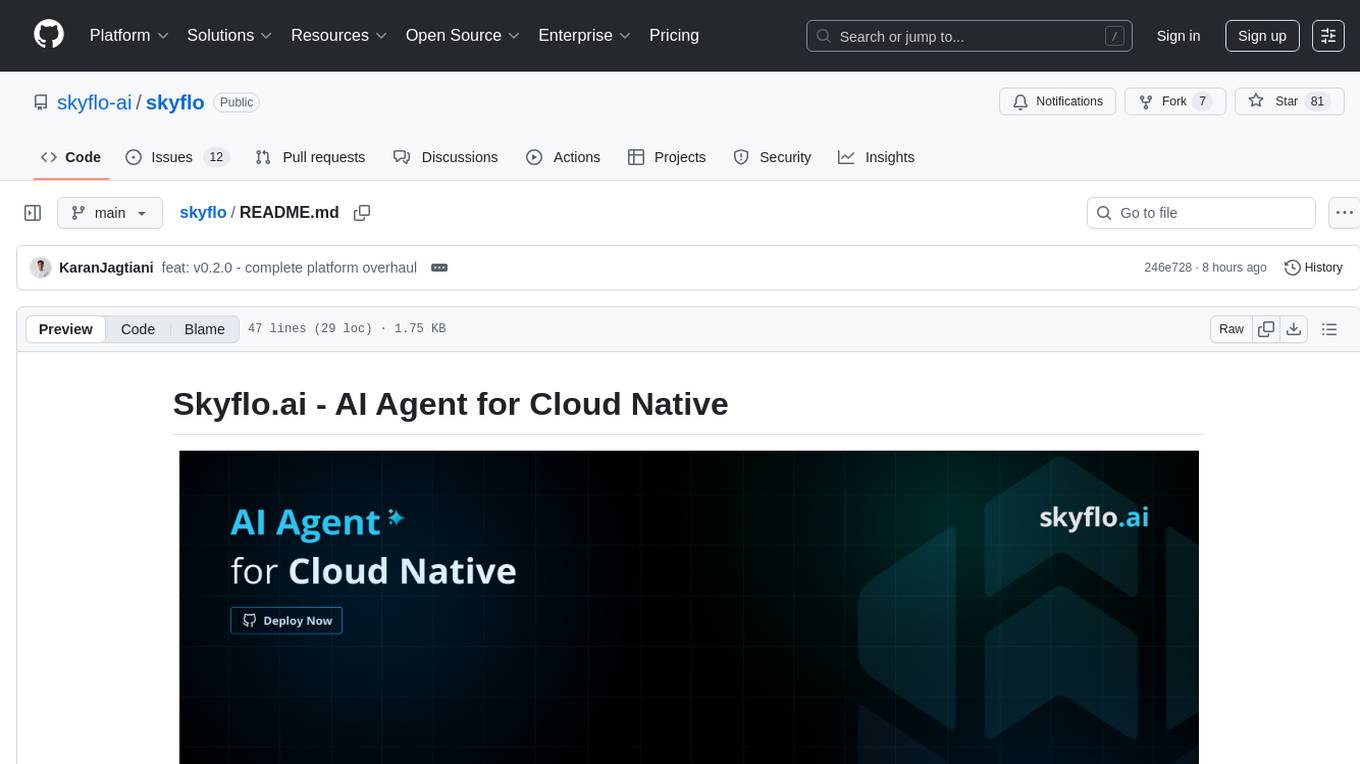
skyflo
Skyflo.ai is an AI agent designed for Cloud Native operations, providing seamless infrastructure management through natural language interactions. It serves as a safety-first co-pilot with a human-in-the-loop design. The tool offers flexible deployment options for both production and local Kubernetes environments, supporting various LLM providers and self-hosted models. Users can explore the architecture of Skyflo.ai and contribute to its development following the provided guidelines and Code of Conduct. The community engagement includes Discord, Twitter, YouTube, and GitHub Discussions.
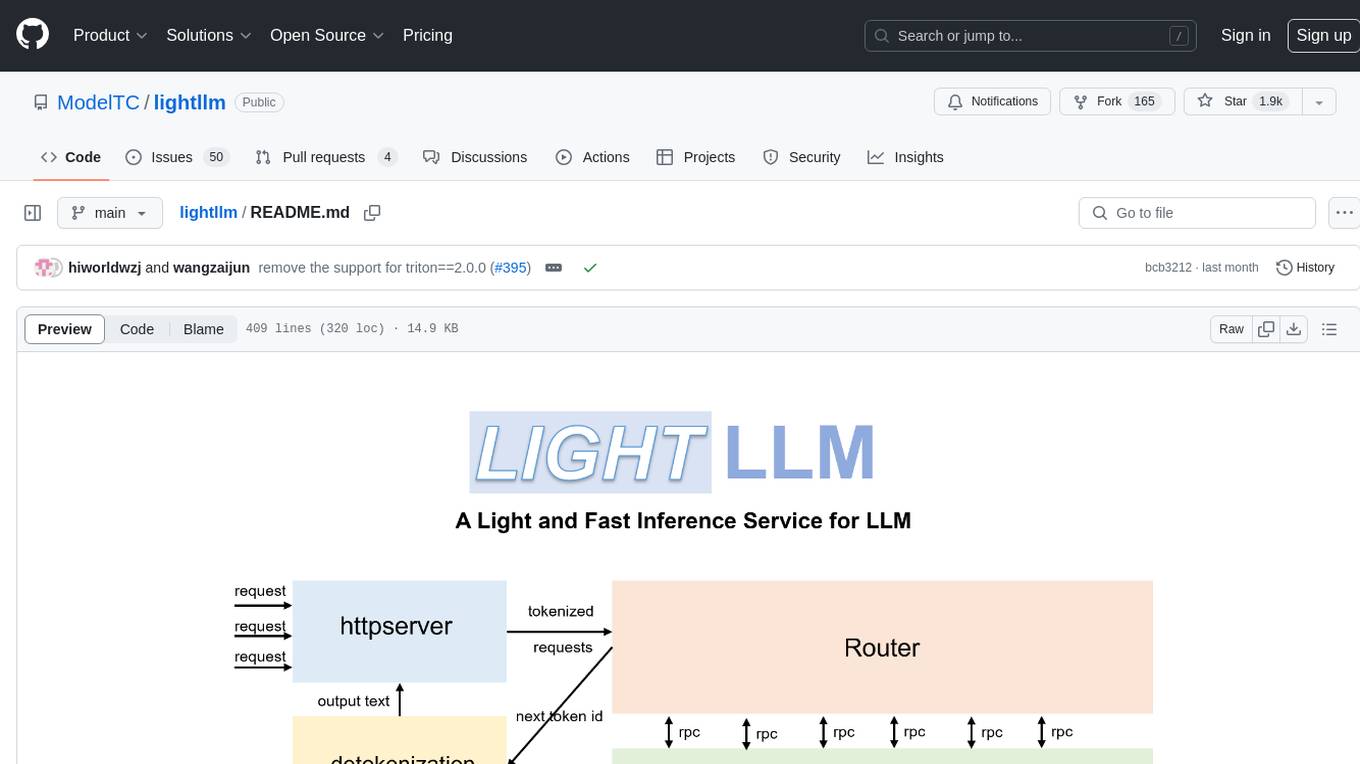
lightllm
LightLLM is a Python-based LLM (Large Language Model) inference and serving framework known for its lightweight design, scalability, and high-speed performance. It offers features like tri-process asynchronous collaboration, Nopad for efficient attention operations, dynamic batch scheduling, FlashAttention integration, tensor parallelism, Token Attention for zero memory waste, and Int8KV Cache. The tool supports various models like BLOOM, LLaMA, StarCoder, Qwen-7b, ChatGLM2-6b, Baichuan-7b, Baichuan2-7b, Baichuan2-13b, InternLM-7b, Yi-34b, Qwen-VL, Llava-7b, Mixtral, Stablelm, and MiniCPM. Users can deploy and query models using the provided server launch commands and interact with multimodal models like QWen-VL and Llava using specific queries and images.
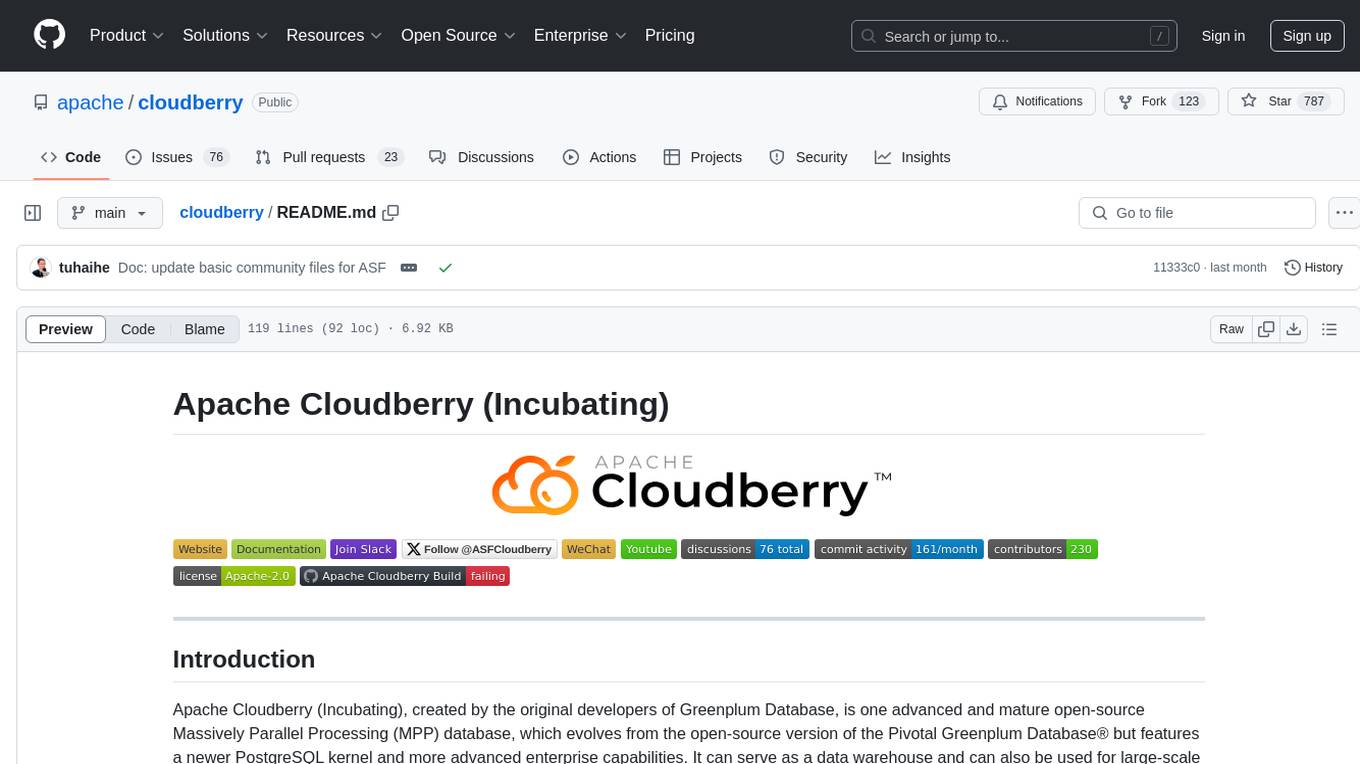
cloudberry
Apache Cloudberry (Incubating) is an advanced and mature open-source Massively Parallel Processing (MPP) database, evolving from the open-source version of the Pivotal Greenplum Database®️. It features a newer PostgreSQL kernel and advanced enterprise capabilities, serving as a data warehouse for large-scale analytics and AI/ML workloads. The main repository includes ecosystem repositories for the website, extensions, connectors, adapters, and utilities.

Geoweaver
Geoweaver is an in-browser software that enables users to easily compose and execute full-stack data processing workflows using online spatial data facilities, high-performance computation platforms, and open-source deep learning libraries. It provides server management, code repository, workflow orchestration software, and history recording capabilities. Users can run it from both local and remote machines. Geoweaver aims to make data processing workflows manageable for non-coder scientists and preserve model run history. It offers features like progress storage, organization, SSH connection to external servers, and a web UI with Python support.
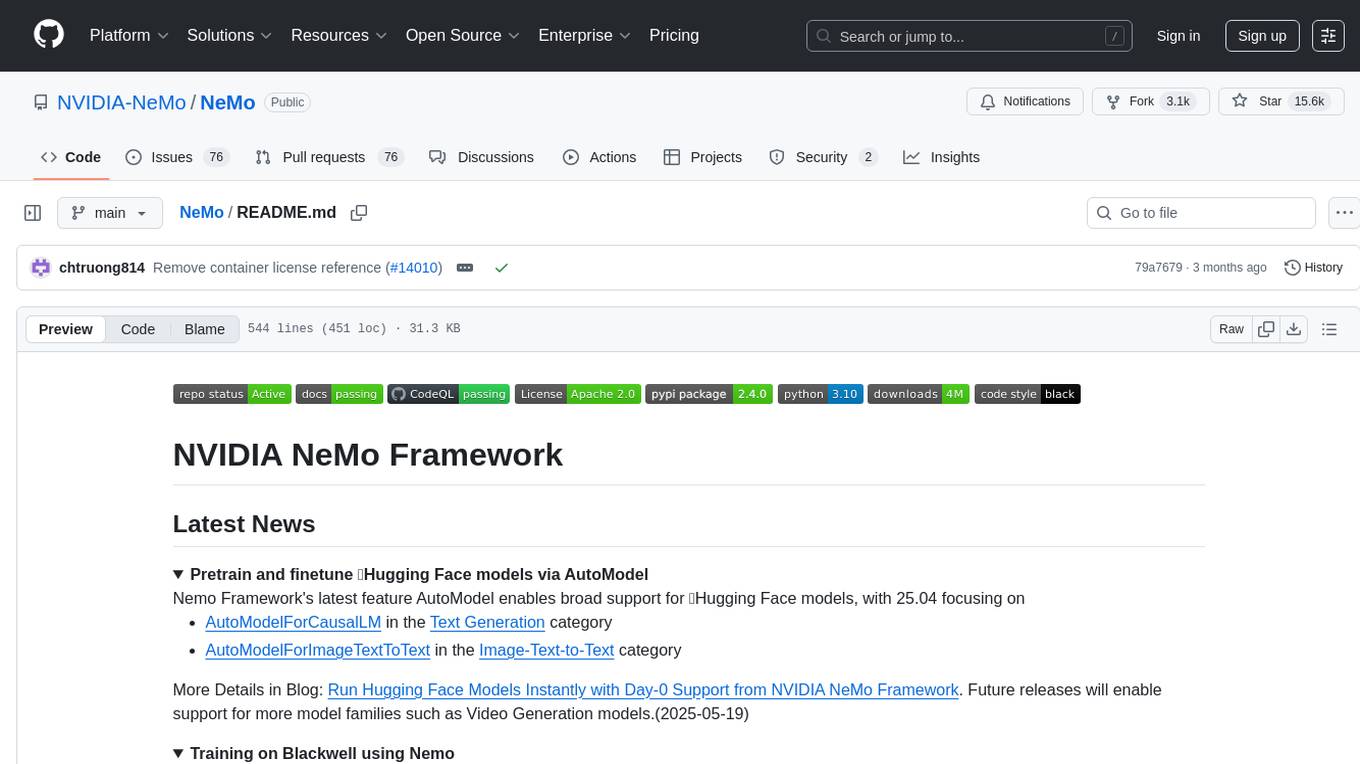
NeMo
NVIDIA NeMo Framework is a scalable and cloud-native generative AI framework built for researchers and PyTorch developers working on Large Language Models (LLMs), Multimodal Models (MMs), Automatic Speech Recognition (ASR), Text to Speech (TTS), and Computer Vision (CV) domains. It is designed to help you efficiently create, customize, and deploy new generative AI models by leveraging existing code and pre-trained model checkpoints.
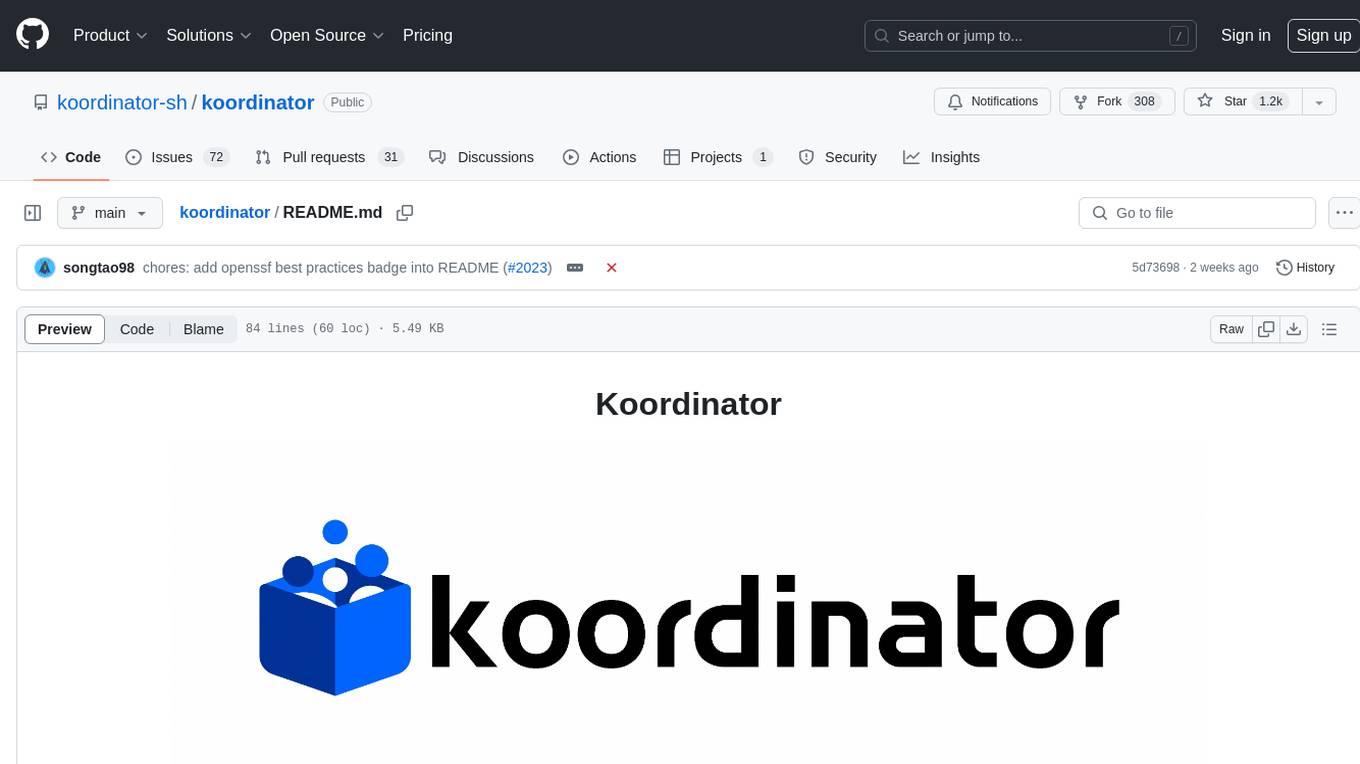
koordinator
Koordinator is a QoS based scheduling system for hybrid orchestration workloads on Kubernetes. It aims to improve runtime efficiency and reliability of latency sensitive workloads and batch jobs, simplify resource-related configuration tuning, and increase pod deployment density. It enhances Kubernetes user experience by optimizing resource utilization, improving performance, providing flexible scheduling policies, and easy integration into existing clusters.
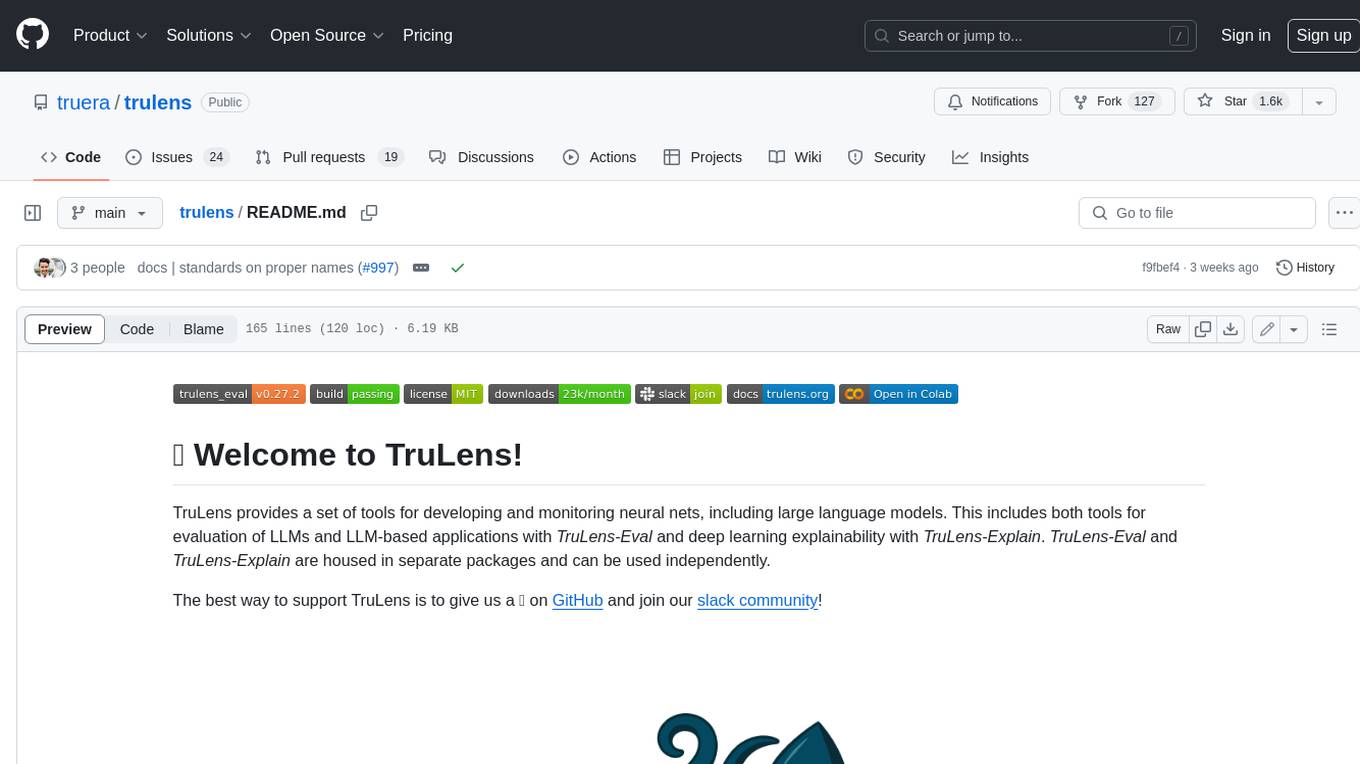
trulens
TruLens provides a set of tools for developing and monitoring neural nets, including large language models. This includes both tools for evaluation of LLMs and LLM-based applications with _TruLens-Eval_ and deep learning explainability with _TruLens-Explain_. _TruLens-Eval_ and _TruLens-Explain_ are housed in separate packages and can be used independently.
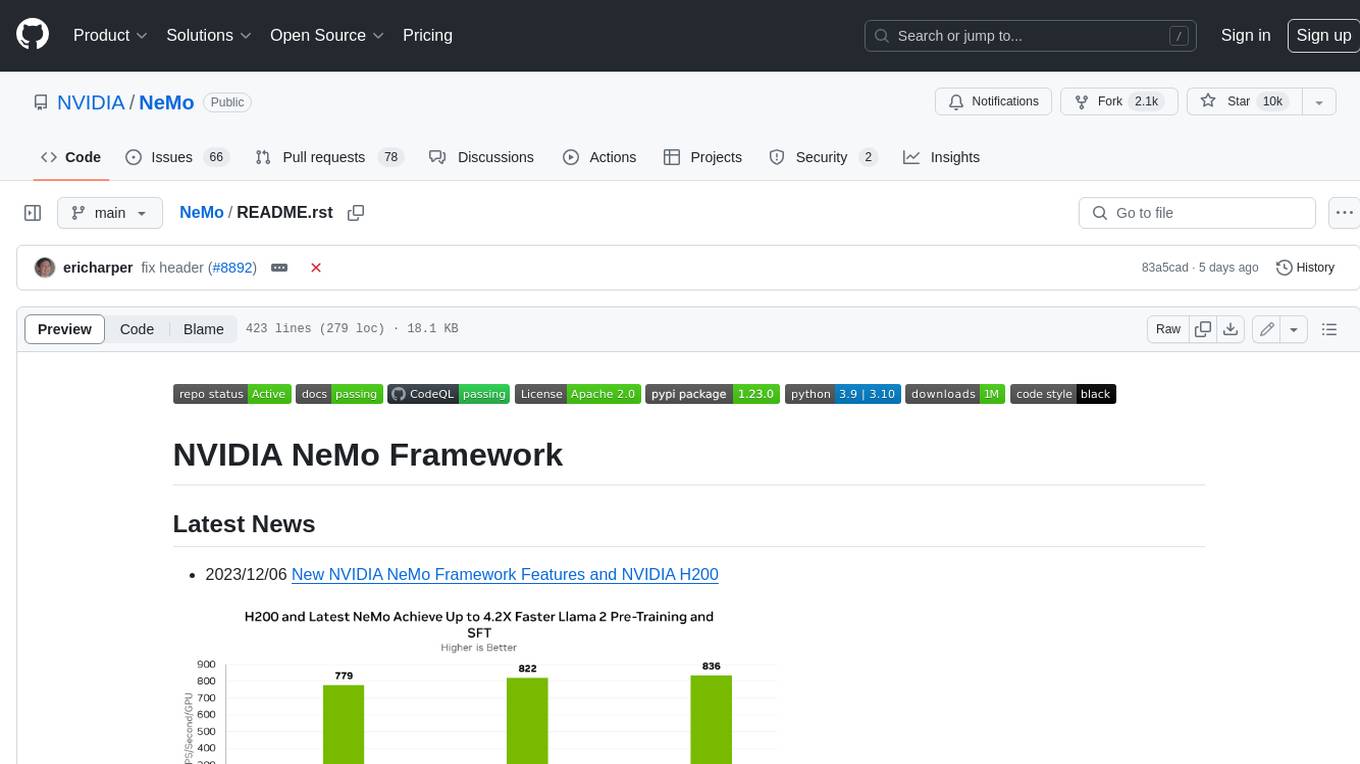
NeMo
NeMo Framework is a generative AI framework built for researchers and pytorch developers working on large language models (LLMs), multimodal models (MM), automatic speech recognition (ASR), and text-to-speech synthesis (TTS). The primary objective of NeMo is to provide a scalable framework for researchers and developers from industry and academia to more easily implement and design new generative AI models by being able to leverage existing code and pretrained models.

Revornix
Revornix is an information management tool designed for the AI era. It allows users to conveniently integrate all visible information and generates comprehensive reports at specific times. The tool offers cross-platform availability, all-in-one content aggregation, document transformation & vectorized storage, native multi-tenancy, localization & open-source features, smart assistant & built-in MCP, seamless LLM integration, and multilingual & responsive experience for users.

buildel
Buildel is an AI automation platform that empowers users to create versatile workflows without writing code. It supports multiple providers and interfaces, offers pre-built use cases, and allows users to bring their own API keys. Ideal for AI-powered document retrieval, conversational interfaces, and data integration. Users can get started at app.buildel.ai or run Buildel locally with Node.js, Elixir/Erlang, Docker, Git, and JQ installed. Join the community on Discord for support and discussions.
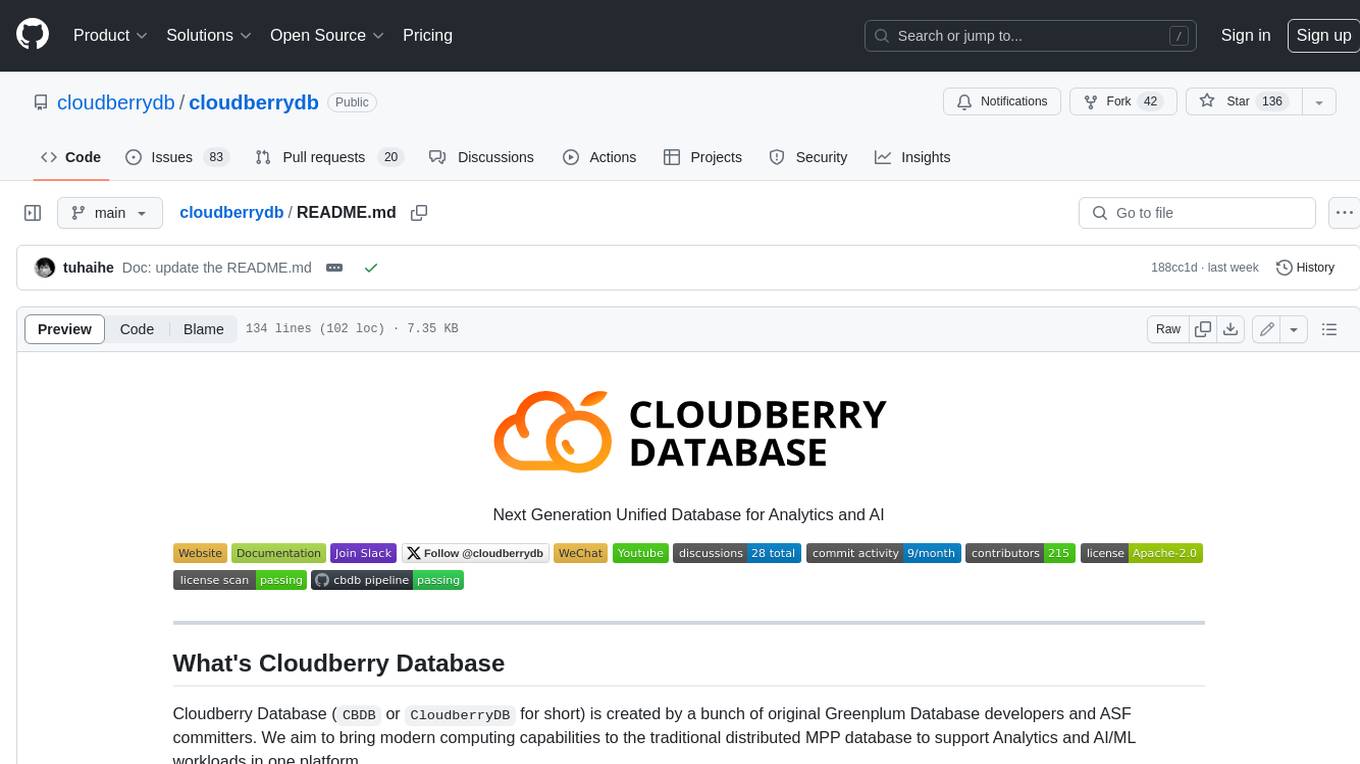
cloudberrydb
Cloudberry Database (CBDB or CloudberryDB) is a next-generation unified database for analytics and AI. It is created by a bunch of original Greenplum Database developers and ASF committers. Cloudberry Database aims to bring modern computing capabilities to the traditional distributed MPP database to support Analytics and AI/ML workloads in one platform.
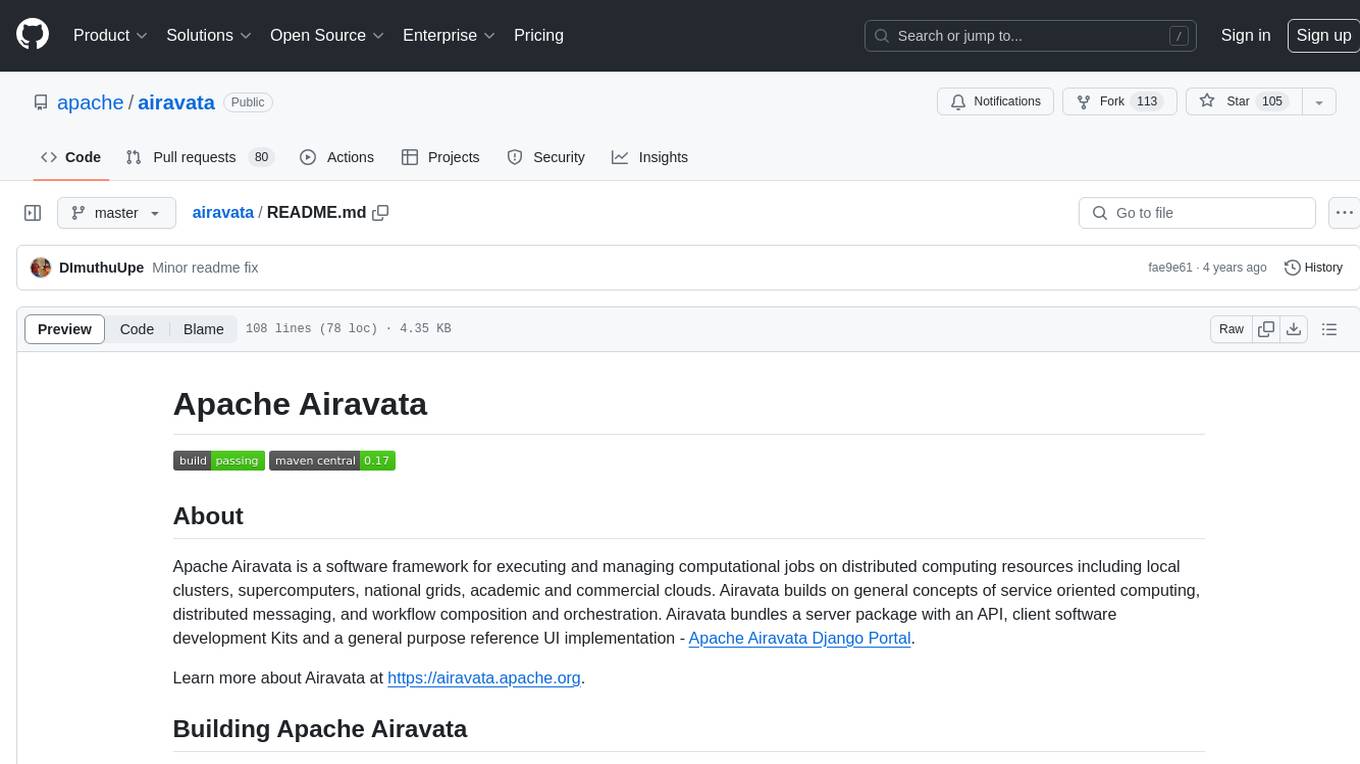
airavata
Apache Airavata is a software framework for executing and managing computational jobs on distributed computing resources. It supports local clusters, supercomputers, national grids, academic and commercial clouds. Airavata utilizes service-oriented computing, distributed messaging, and workflow composition. It includes a server package with an API, client SDKs, and a general-purpose UI implementation called Apache Airavata Django Portal.
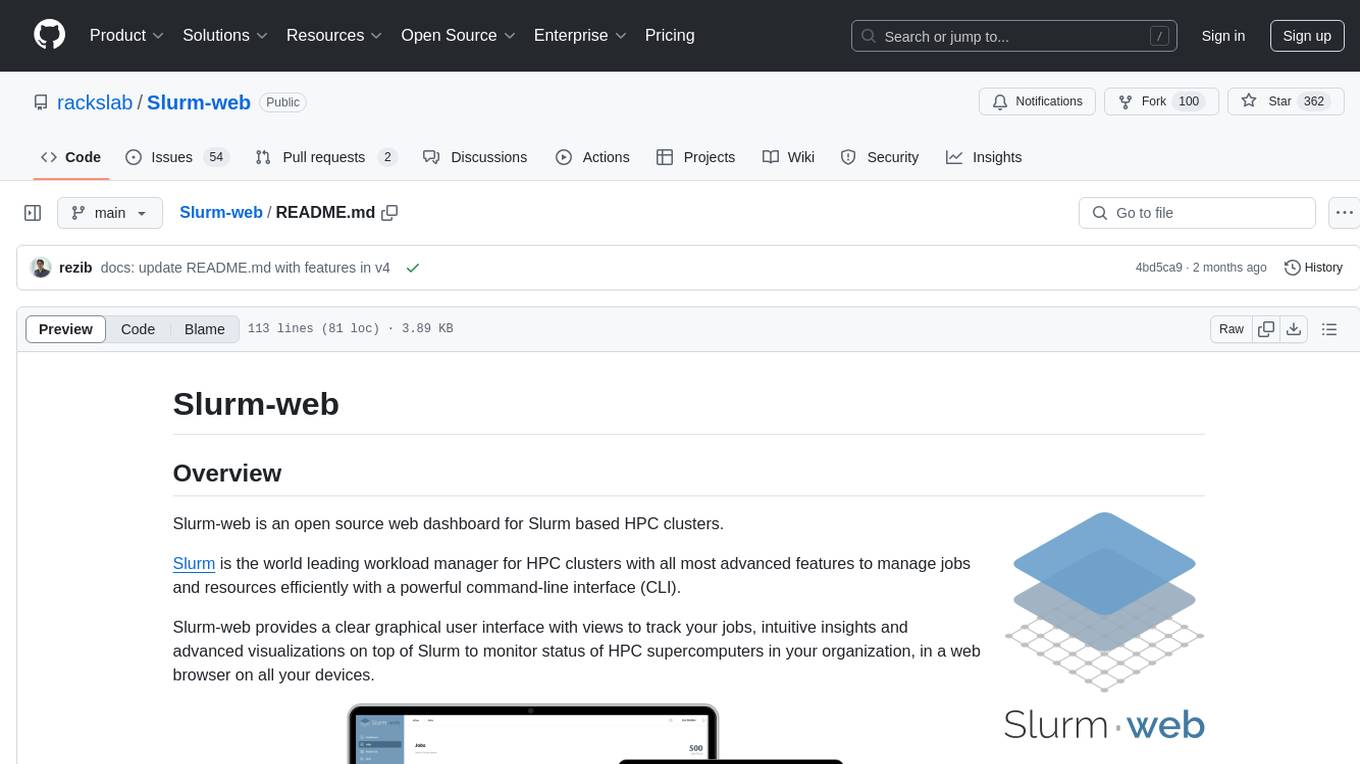
Slurm-web
Slurm-web is an open source web dashboard designed for Slurm based HPC clusters. It provides a graphical user interface to track jobs, insights, and visualizations for monitoring HPC supercomputers. The tool offers features like interactive charts, job filtering, live status updates, node visualization, RBAC permissions, LDAP authentication, and integration with Prometheus for metrics collection.
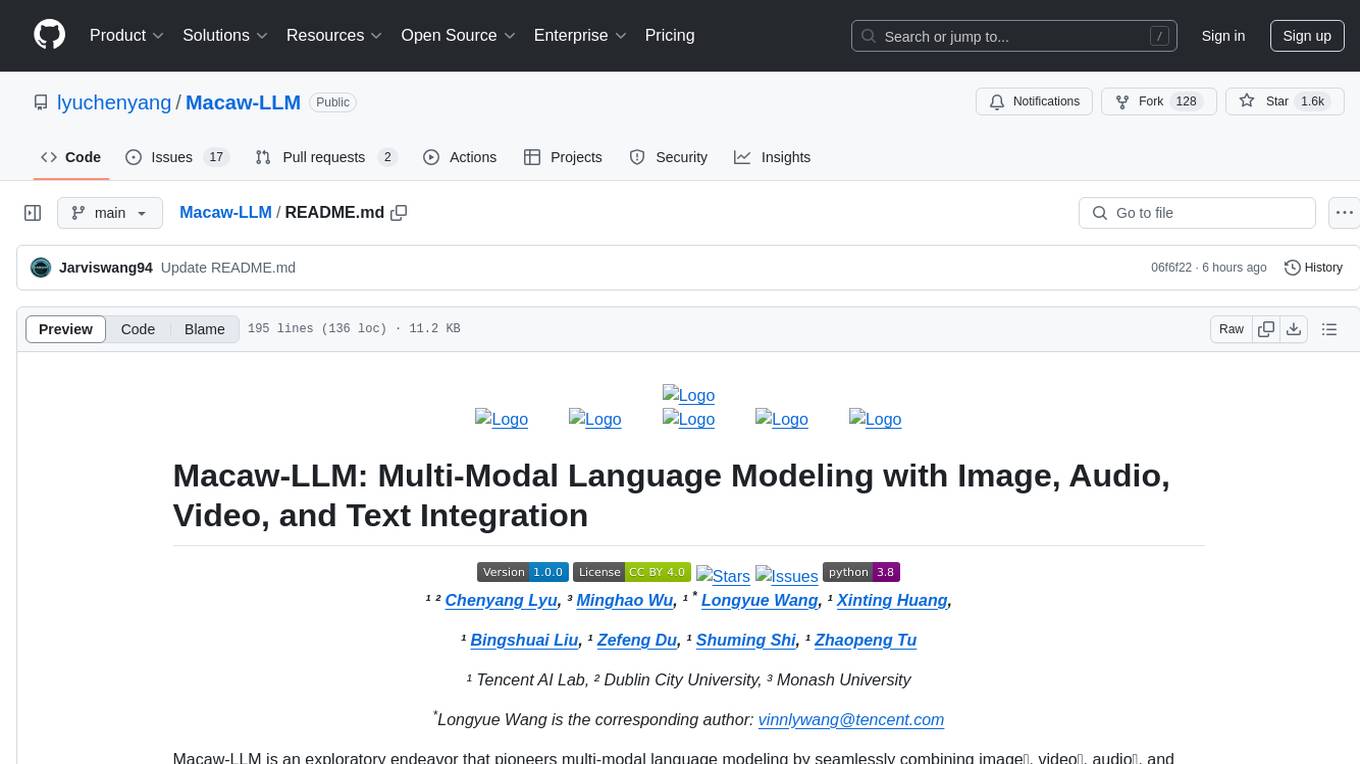
Macaw-LLM
Macaw-LLM is a pioneering multi-modal language modeling tool that seamlessly integrates image, audio, video, and text data. It builds upon CLIP, Whisper, and LLaMA models to process and analyze multi-modal information effectively. The tool boasts features like simple and fast alignment, one-stage instruction fine-tuning, and a new multi-modal instruction dataset. It enables users to align multi-modal features efficiently, encode instructions, and generate responses across different data types.
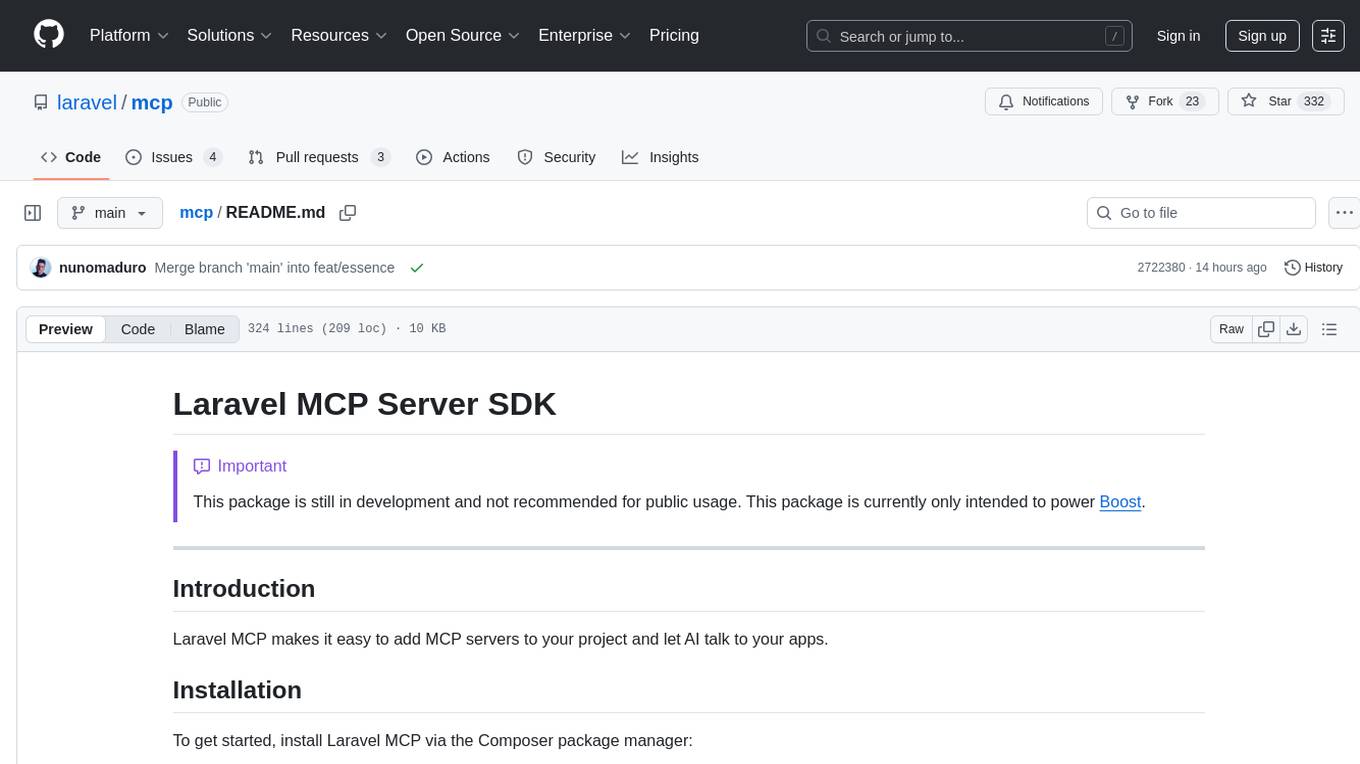
mcp
Laravel MCP Server SDK makes it easy to add MCP servers to your project and let AI talk to your apps. It provides tools for creating servers, tools, resources, prompts, and registering servers for web-based and local access. The package includes features for handling tool inputs, annotating tools, tool results, streaming tool responses, creating resources, creating prompts, and authentication using Laravel Passport. The MCP Inspector tool is available for testing and debugging servers.
For similar tasks
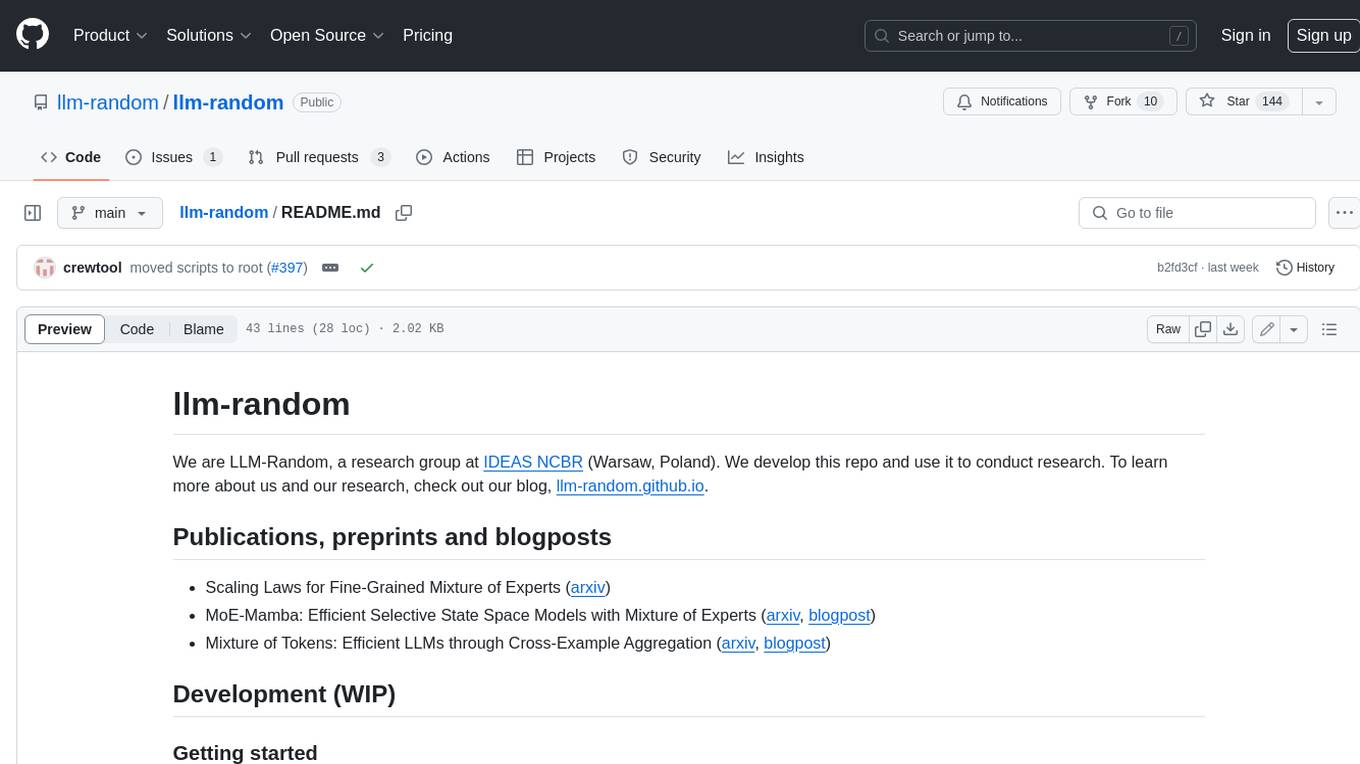
llm-random
This repository contains code for research conducted by the LLM-Random research group at IDEAS NCBR in Warsaw, Poland. The group focuses on developing and using this repository to conduct research. For more information about the group and its research, refer to their blog, llm-random.github.io.

TrustLLM
TrustLLM is a comprehensive study of trustworthiness in LLMs, including principles for different dimensions of trustworthiness, established benchmark, evaluation, and analysis of trustworthiness for mainstream LLMs, and discussion of open challenges and future directions. Specifically, we first propose a set of principles for trustworthy LLMs that span eight different dimensions. Based on these principles, we further establish a benchmark across six dimensions including truthfulness, safety, fairness, robustness, privacy, and machine ethics. We then present a study evaluating 16 mainstream LLMs in TrustLLM, consisting of over 30 datasets. The document explains how to use the trustllm python package to help you assess the performance of your LLM in trustworthiness more quickly. For more details about TrustLLM, please refer to project website.

trainer
Kubeflow Trainer is a Kubernetes-native project for fine-tuning large language models (LLMs) and enabling scalable, distributed training of machine learning (ML) models across various frameworks. It allows integration with ML libraries like HuggingFace, DeepSpeed, or Megatron-LM to orchestrate ML training on Kubernetes. Develop LLMs effortlessly with the Kubeflow Python SDK and build Kubernetes-native Training Runtimes with Kubernetes Custom Resources APIs.
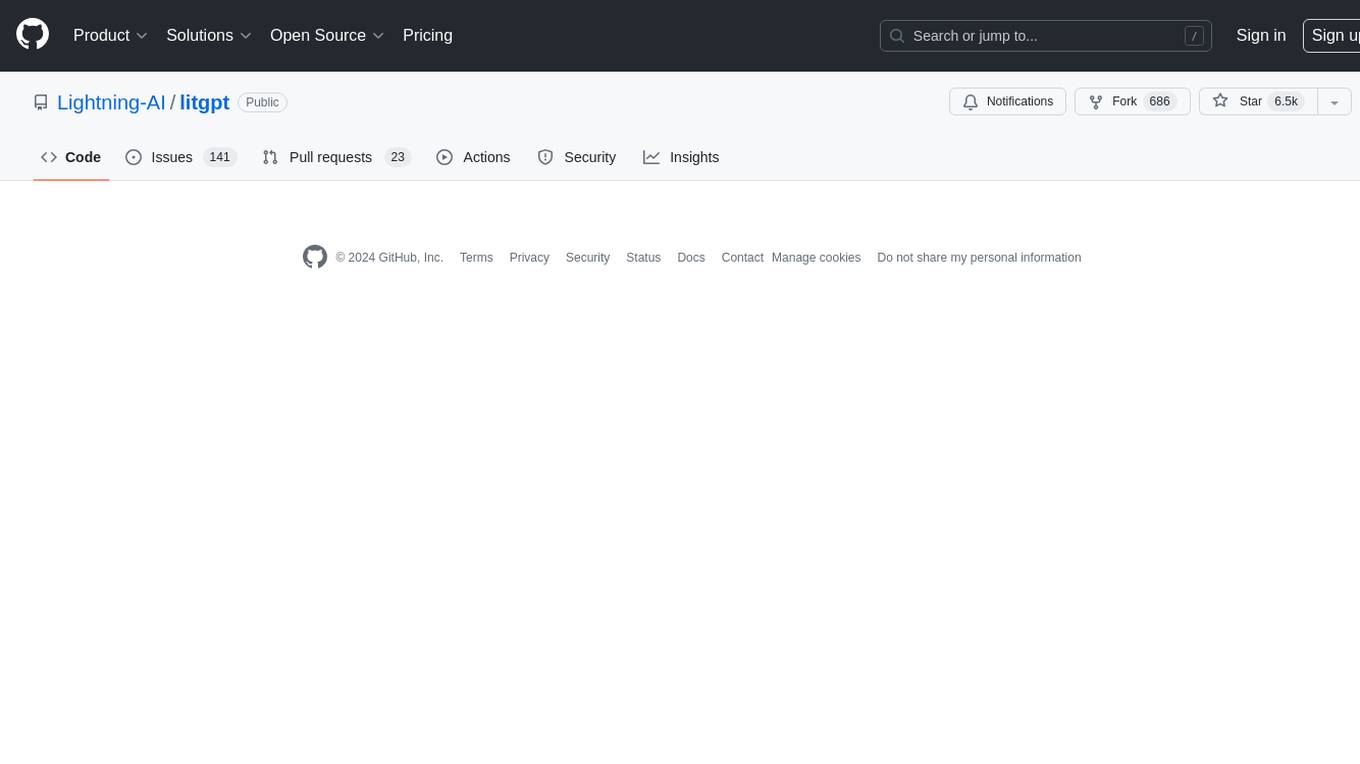
litgpt
LitGPT is a command-line tool designed to easily finetune, pretrain, evaluate, and deploy 20+ LLMs **on your own data**. It features highly-optimized training recipes for the world's most powerful open-source large-language-models (LLMs).
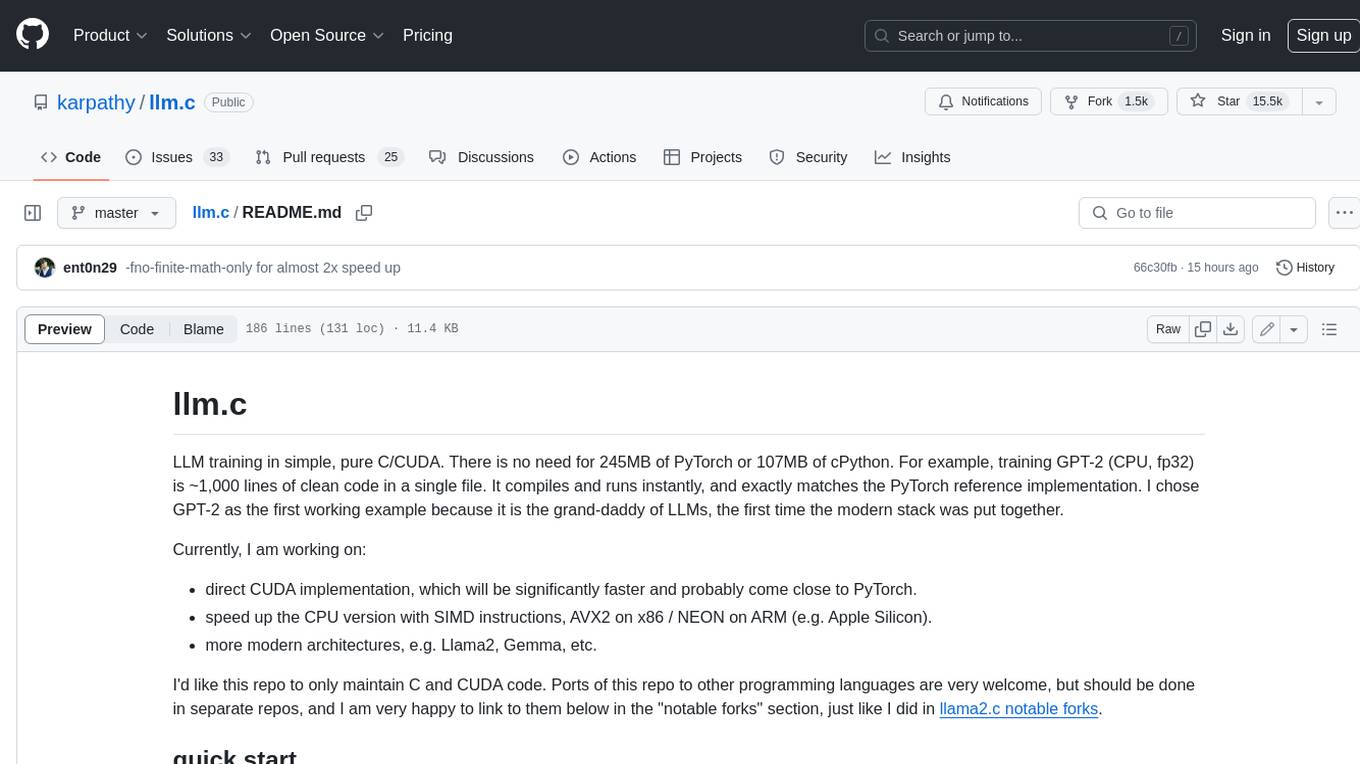
llm.c
LLM training in simple, pure C/CUDA. There is no need for 245MB of PyTorch or 107MB of cPython. For example, training GPT-2 (CPU, fp32) is ~1,000 lines of clean code in a single file. It compiles and runs instantly, and exactly matches the PyTorch reference implementation. I chose GPT-2 as the first working example because it is the grand-daddy of LLMs, the first time the modern stack was put together.
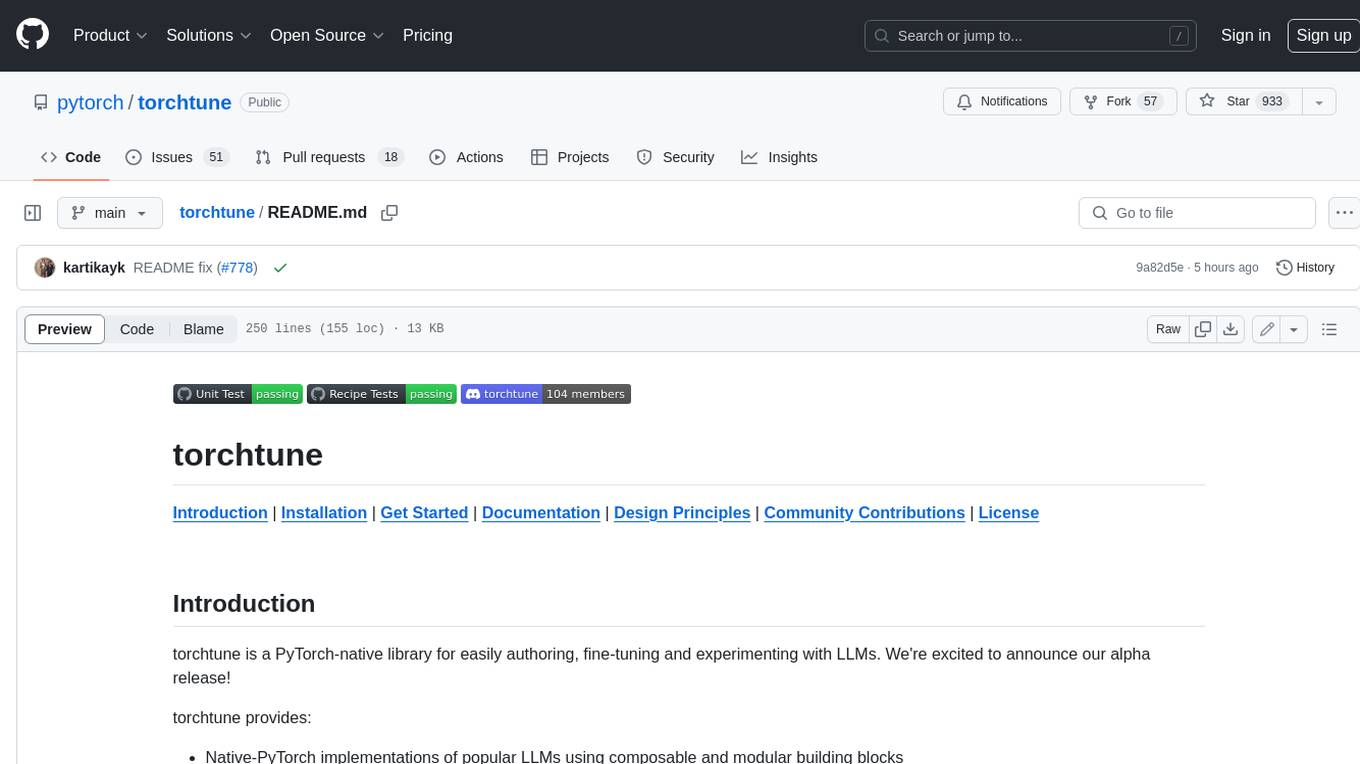
torchtune
Torchtune is a PyTorch-native library for easily authoring, fine-tuning, and experimenting with LLMs. It provides native-PyTorch implementations of popular LLMs using composable and modular building blocks, easy-to-use and hackable training recipes for popular fine-tuning techniques, YAML configs for easily configuring training, evaluation, quantization, or inference recipes, and built-in support for many popular dataset formats and prompt templates to help you quickly get started with training.
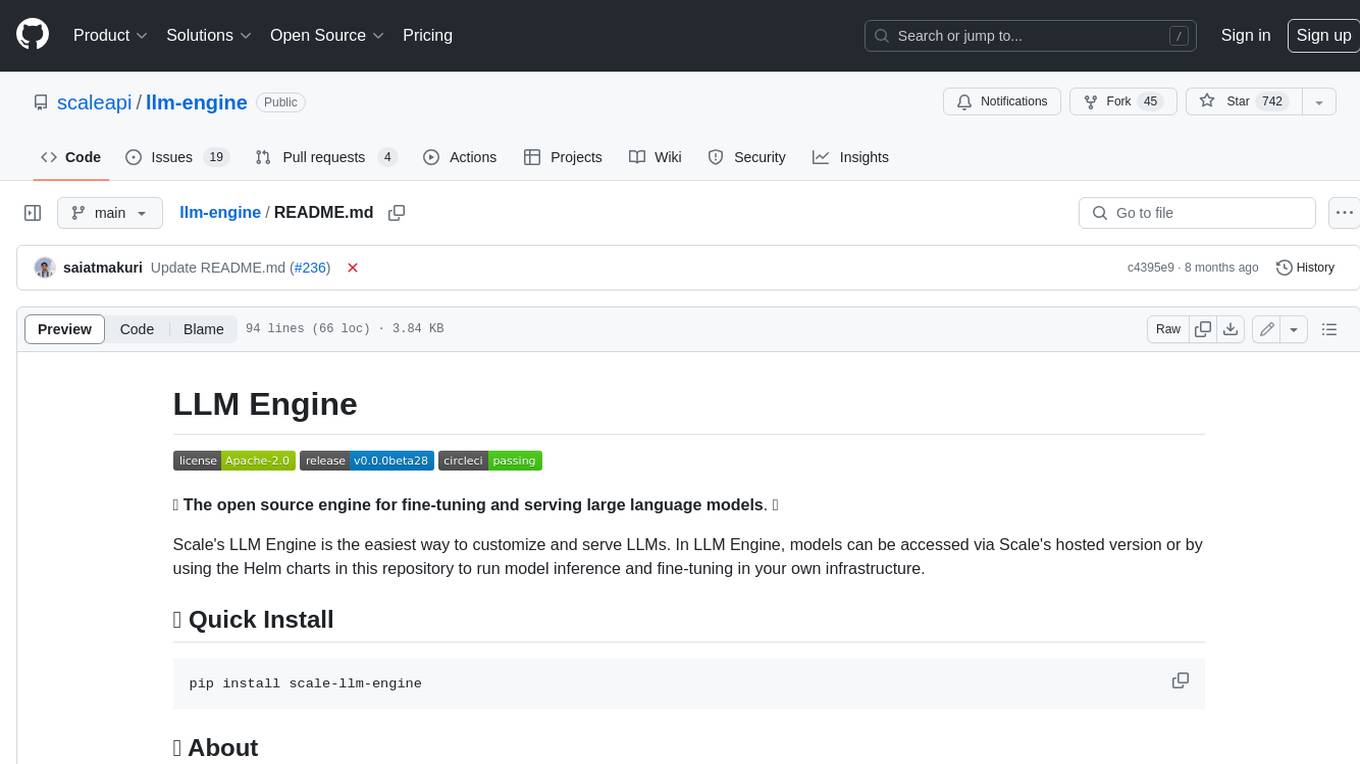
llm-engine
Scale's LLM Engine is an open-source Python library, CLI, and Helm chart that provides everything you need to serve and fine-tune foundation models, whether you use Scale's hosted infrastructure or do it in your own cloud infrastructure using Kubernetes.
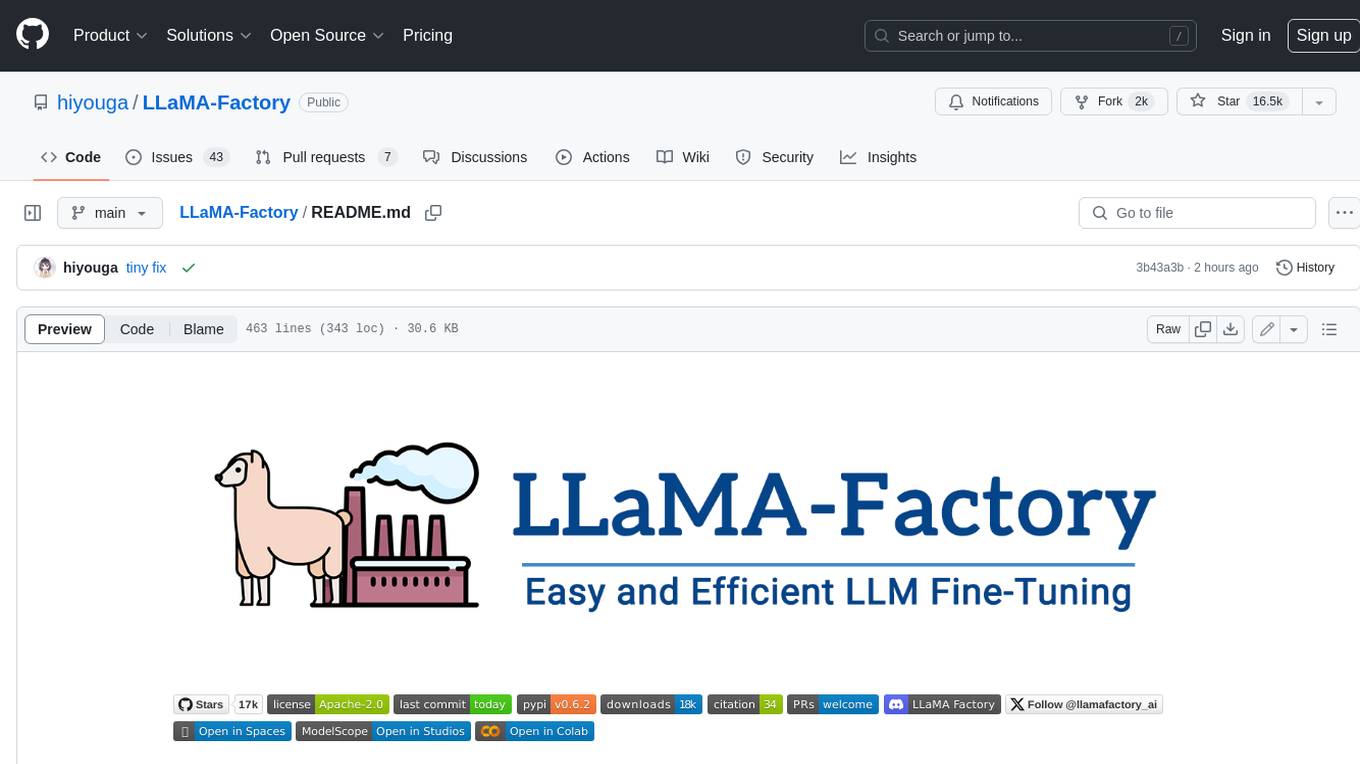
LLaMA-Factory
LLaMA Factory is a unified framework for fine-tuning 100+ large language models (LLMs) with various methods, including pre-training, supervised fine-tuning, reward modeling, PPO, DPO and ORPO. It features integrated algorithms like GaLore, BAdam, DoRA, LongLoRA, LLaMA Pro, LoRA+, LoftQ and Agent tuning, as well as practical tricks like FlashAttention-2, Unsloth, RoPE scaling, NEFTune and rsLoRA. LLaMA Factory provides experiment monitors like LlamaBoard, TensorBoard, Wandb, MLflow, etc., and supports faster inference with OpenAI-style API, Gradio UI and CLI with vLLM worker. Compared to ChatGLM's P-Tuning, LLaMA Factory's LoRA tuning offers up to 3.7 times faster training speed with a better Rouge score on the advertising text generation task. By leveraging 4-bit quantization technique, LLaMA Factory's QLoRA further improves the efficiency regarding the GPU memory.
For similar jobs

weave
Weave is a toolkit for developing Generative AI applications, built by Weights & Biases. With Weave, you can log and debug language model inputs, outputs, and traces; build rigorous, apples-to-apples evaluations for language model use cases; and organize all the information generated across the LLM workflow, from experimentation to evaluations to production. Weave aims to bring rigor, best-practices, and composability to the inherently experimental process of developing Generative AI software, without introducing cognitive overhead.

LLMStack
LLMStack is a no-code platform for building generative AI agents, workflows, and chatbots. It allows users to connect their own data, internal tools, and GPT-powered models without any coding experience. LLMStack can be deployed to the cloud or on-premise and can be accessed via HTTP API or triggered from Slack or Discord.

VisionCraft
The VisionCraft API is a free API for using over 100 different AI models. From images to sound.

kaito
Kaito is an operator that automates the AI/ML inference model deployment in a Kubernetes cluster. It manages large model files using container images, avoids tuning deployment parameters to fit GPU hardware by providing preset configurations, auto-provisions GPU nodes based on model requirements, and hosts large model images in the public Microsoft Container Registry (MCR) if the license allows. Using Kaito, the workflow of onboarding large AI inference models in Kubernetes is largely simplified.

PyRIT
PyRIT is an open access automation framework designed to empower security professionals and ML engineers to red team foundation models and their applications. It automates AI Red Teaming tasks to allow operators to focus on more complicated and time-consuming tasks and can also identify security harms such as misuse (e.g., malware generation, jailbreaking), and privacy harms (e.g., identity theft). The goal is to allow researchers to have a baseline of how well their model and entire inference pipeline is doing against different harm categories and to be able to compare that baseline to future iterations of their model. This allows them to have empirical data on how well their model is doing today, and detect any degradation of performance based on future improvements.

tabby
Tabby is a self-hosted AI coding assistant, offering an open-source and on-premises alternative to GitHub Copilot. It boasts several key features: * Self-contained, with no need for a DBMS or cloud service. * OpenAPI interface, easy to integrate with existing infrastructure (e.g Cloud IDE). * Supports consumer-grade GPUs.

spear
SPEAR (Simulator for Photorealistic Embodied AI Research) is a powerful tool for training embodied agents. It features 300 unique virtual indoor environments with 2,566 unique rooms and 17,234 unique objects that can be manipulated individually. Each environment is designed by a professional artist and features detailed geometry, photorealistic materials, and a unique floor plan and object layout. SPEAR is implemented as Unreal Engine assets and provides an OpenAI Gym interface for interacting with the environments via Python.

Magick
Magick is a groundbreaking visual AIDE (Artificial Intelligence Development Environment) for no-code data pipelines and multimodal agents. Magick can connect to other services and comes with nodes and templates well-suited for intelligent agents, chatbots, complex reasoning systems and realistic characters.



